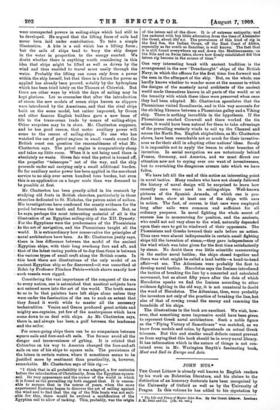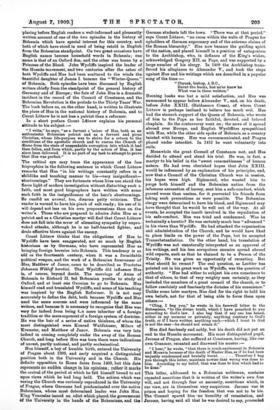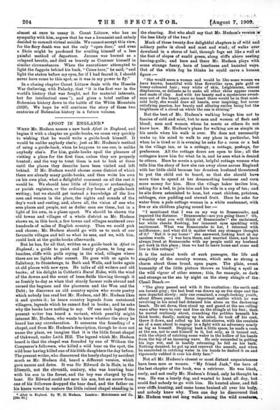JOHN HITS.*
THE Count Liitzow is already well known to English readers by his work on Bohemian literature, and his claims to the distinction of an honorary doctorate have been recognised by the University of Oxford as well as by the University of Prague. In this volume he has added to his reputation by " The Life and Times of Master John Hu. By the Count Latiow, Londoni J. M. Dent and Co. [12s. 6d. -net.1 placing before English readers a well-informed and pleasantly, written account of one of the two episodes in the history of Bohemia which have special interest for this country, and. both of which have stood in need of being retold in English. from the Bohemian standpoint. On two great occasions have English names become household words in Bohemia; one
name is that of an Oxford don, and the other was borne by a' Princess of the Blood. John Wycliffe inspired the leader of the Hussite movement, and two centuries after the ashes of both Wycliffe and Hue had been scattered to the winds the beautiful daughter of James I. became the "Winter-Queen" of Bohemia. Both episodes have been discussed by English writers chiefly from the standpoint of the general history of: -Germany and of Europe; the fate of John Hus is a dramatic incident in the record of the Council of Constance, and the Bohemian Revolution is the prelude to the Thirty Years' War. The book before us, on the other hand, is written to illustrate. the place of Hue in the national history of Bohemia, and to Count Liitzow he is not less a patriot than a reformer.
In a short preface Count Liitzow explains his personal attitude to his subject :—
" I write," he says, "as a fervent s 'mirer of Hus, both as an enthusiastic Bohemian patriot and as a fervent and pious Christian, whose life-purpose was to strive for a return to the 'conditions of the apostolic church and to rescue the Church of; :Rome from the state of unspeakable corruption into which it had then fallen, and from which, partly by the action of Hue, it has since been delivered. It is no part of my task to attempt to prove 'that Hus was perfect."
"The critical eye may trace the appearance of the lees biographica in the following sentence in which Count Liitzow "remarks that Hue "in his writings constantly refers in a childlike and touching manner to his—very insignificant- -shortcomings." They are fortunate whose lives can stand the
'fierce light of modern investigation without disturbing such a 'faith, and most good biographers have written with some such faith in the insignificance of the hero's shortcomings. So candid an avowal, too, disarms petty criticism. The reader is warned to have his pinch of salt ready ; his use of it will depend not less on his own prepossessions than on the -writer's. Those who are prepared to admire John Hus as a patriot and as a Christian martyr will find that Count Initzow. aloes not fall into the error of alienating sympathy by unpro- voked attacks, although he is no half-hearted fighter, and deals effective blows against the enemy.
Count Liitzow thinks that the obligations of Hus to Wycliffe have been exaggerated, not so much by English historians as by Germans, who have represented Hus as bringing foreign heresies into Bohemia. This tendency is as Old as the fourteenth century, when it was a formidable political weapon, and the work of a Bohemian forerunner of Hus, Matthew of Janov, came to be described as Tractatus Johannis Wiklef heretici. That Wycliffe did influence Hued is, of course, beyond doubt. The marriage of Anne of ' Bohemia to Richard II. led Bohemian youths to study at I Oxford, and at least one Oxonian to go to "Bohemia. Hue himself read and translated Wycliffe, and some of his teaching was inspired by the English Reformer. It is not easy accurately to define the debt, both because Wycliffe and Hus used the same sources and were influenced by the same writers, and because it is necessary to recognise that Hue was very far indeed from being t..e mere inheritor of a foreign tradition or the mere exponent of a foreign system of doctrine. He was the heir of a series of native thinkers, of whom the most distinguished were Konrad Waldhauser, Milecz of Kremsier, and Matthew of Janov. Bohemia was very late indeed in coming completely under the sway of the Roman Church, and long before Hue was born there were indications of unrest, partly national, and partly ecclesiastical.
Hue himself, a boy of humble birth, entered the University of Prague about 1389, and early acquired a distinguished position both in the University and in the Church. His definite opposition to Rome dates from 1408, but this date represents no sudden change in his opinions ; rather it marks the arrival of the period at which he felt himself bound to act upon views which he had long held. The schism which was vexing the Church was curiously reproduced in the University of Prague, where Germans had predominated over the native Bohemians, whose most determined leader was John Hue. King Venceslas issued an edict which placed the government of the University in the hands of the Bohemians, and the German students left the town. "There was at that period," says Count Liitzow, "no room within the walls of Prague for upholders of German supremacy and of the extreme claims of
the Roman hierarchy." Hue now became the guiding spirit of the nation, and placed himself in a position of antagonism to the Archbishop, who, in defiance of the King's wishes, acknowledged Gregory XH. as Pope, and was supported by a large number of his clergy. In 1409 the Archbishop trans- ferred his allegiance to Alexander V., and took the steps against Hua and his writings which are described in a popular song of the time :--
"Zbynek, bishop, A.B.C.,
Burnt the books, but ne'er knew he What was in them written."
Burning books was but a mild satisfaction, and Hue was summoned to appear before Alexander V., and, on his death, before John XXIII, (Baldassare Coen), of whom Count Liitzow is perhaps inclined to believe too much evil. Hus had the staunch support of the Queen of Bohemia, who wrote of him to the Pope as her faithful, devoted, and beloved chaplain. So the controversy went on ; the news of it spread abroad over Europe, and English Wycliffites sympathised with Hus, while the other side spoke of Bohemia as a country tainted with heresy. Hus was excommunicated, and Prague placed under interdict. In 1412 be went voluntarily into exile.
Meanwhile the great Council of Constance met, and Hus decided to attend and stand his trial. He was, in fact, a martyr to his belief in the "sweet reasonableness" of human nature. He had even cherished hopes that John XXIII. would be influenced by an explanation of his principles, and, now that a Council of the Christian Church was in session, his hopes were high. Sigismund, who wanted him to purge both himself and the Bohemian nation from the infamous accusation of heresy, sent him a safe-conduct, which proved worse than useless, for it prevented his friends from taking such precautions as were possible. The Bohemian clergy were determined to have his blood, and Sigismund may have thought that he would be well out of the way. At all events, he accepted the insult involved in the repudiation of his safe-conduct. Hus was tried and condemned. Was he technically a heretic? He was certainly much less " advanced " in his views than Wycliffe. He had attacked the organisation and administration of the Church, and he would have liked to place limits on the power of the Pope, but he accepted Transubstantiation. On the other hand, his translation of Wycliffe was not unnaturally interpreted as an approval of hie writings, and his less scrupulous enemies spread abroad wild reports, such as that he claimed to be a Person of the Trinity. He was given an opportunity of recanting. But what should he recant ? The real question, as Lechler has pointed out in his great work on Wycliffe, was the question of authority. "Hue had either to subject his own conscience to that of others, to that of very weighty men certainly, as they ineluded the members of a great council of the church, or to follow resolutely and fearlessly the dictates of his conscience." Unlike some later martyrs, Hue died for the right to hold his own beliefs, not for that of being able to force them upon
others:— "Cling, I beg you," he wrote in his farewell letter to the Bohemians, "to the divine truth, which I have preached, to you according to God's law. I also beg that if any one has heard, either in my sermons or privately, anything contrary to God's truth, or if I have written anything such—which I trust to God is not the ease—he should not retain it."
Hus died fearlessly and nobly, but his death did not put an end to the Hussite movement. His most distinguished pupil, Jerome of Prague, also suffered at Constance, having, like our own Cranmer, recanted and disowned his master :—
" I hear," he wrote, "that there is much excitement in Bohemia and Moravia because of the death of Master Hus, as if he had been unjustly condemned and brutally burnt Therefore I beg you through this letter, maintain nowise that wrong was done to him. According to my belief, that was done to him which had to be done."
This letter, addressed to a Bohemian nobleman, contains repeated assertions that it is written of the writer's own free will, and not through fear or necessity, assertions which, in our view, are in •themselves very suspicious. Jerome was in prison and hoping for the freedom that was not to be his.
The Council spared him no humility of recantation, and Jerome, having said all that he was desired to say, proceeded almost at once to unsay it. Count Liitzow, who has no sympathy with him, argues that he was a humanist and calmly decided to commit virtual suicide. We cannot accept this view, for the fiery death was not the only " open door," and even a Stoic might be pardoned for availing himself of a less painful method of departure. Jerome was burned as a relapsed heretic, and died as bravely as Cranmer himself in similar circumstances. When the executioner attempted to light the faggots behind his back, "Come here," he said, "and light the stakes before my eyes, for if I had feared it, I should never have come to this spot, as it was in my power to fly."
In a closing chapter Count Liitzow deals with the Hussite War (believing, with Palacky, that "it is the first war in the world's history that was fought, not for material interests, but for intellectual ones "), and gives a brief outline of Bohemian history down to the battle of the White Mountain (1620). We hope he will continue the story of these two centuries of Bohemian history in a future volume.








































 Previous page
Previous page